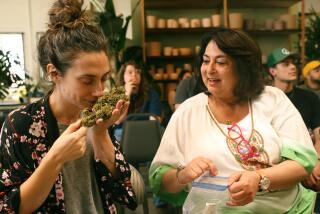Growing Opium Poppies Instead of Wheat
- Share via
Re “Opium Poppies Take Root Once Again in Afghanistan,” Nov. 23: An Afghan farmer gets front-page coverage about his zeal to return to the farming of opium to be sold to the world. His reason for doing this is the time-honored and well-worn excuse most criminals use these days: “The only reason we are doing this is because we are poor.” Boy, never heard that one before.
But in a previous paragraph, he states, “I can make 10 times more with poppy than I can with wheat.” Let’s see here, grow wheat in order to make a decent living and help to feed the world, or grow a plant that will create an illegal narcotic known to devastate the lives of countless people around the world. Oh, I get it; he’s just being a true capitalist, right? I was beginning to believe he was simply another part of the criminal element out there hiding behind the excuse of being oppressed and downtrodden in order to appeal to our country’s love of helping the oppressed and downtrodden. I’m sure he’ll be contacted about distribution any time now. Hey, buddy, anything else we can do for you today?
David Mecey
Los Angeles
Winning the war in Afghanistan and ousting the Taliban may be a hollow victory in the long run. It is projected by next summer that the flow of opium to Pakistan and then to the rest of the world will be on the rise, now that opium farmers can go back to raising their only cash crop. We need to provide them an alternative to growing opium--even if it requires cash, supercrop seeds, farm equipment and whatever else it takes. If not, the cost in the U.S. will far exceed the cost in Afghanistan.
Sol Taylor
Sherman Oaks
The people of Afghanistan face a monumental task to rebuild their country once the fighting subsides substantially. Growing opium poppies is a natural choice for Afghan farmers. There is perhaps a better crop that could help them become self-sufficient with a minimum of investment and with a maximum return. It is a crop that currently has uses in over 50,000 commercial products such as food, clothing, fuel, shelter, plastic, paper and medicine. It grows in most soils, needs little care and produces a marketable crop in one growing season. Just two generations ago, it was called the most profitable and desirable crop that could be grown: industrial hemp.
Even though hemp is banned in the United States, due largely to gross misunderstanding and political propaganda, it is currently experiencing a rebirth in Canada and in parts of Europe. Let’s give the people of Afghanistan a means to create a reliable, profitable and long-term solution to their economic plight. Who knows, maybe one day hemp will catch on in this country, too.
Ted R. Neff
Los Angeles
More to Read
Sign up for The Wild
We’ll help you find the best places to hike, bike and run, as well as the perfect silent spots for meditation and yoga.
You may occasionally receive promotional content from the Los Angeles Times.






